|
|
|
Sort Order |
|
|
|
Items / Page
|
|
|
|
|
|
|
| Srl | Item |
| 1 |
ID:
174034


|
|
|
|
|
| Summary/Abstract |
The article presents narratives of young Bedouin women who attended Jewish schools. An analysis of in-depth interviews conducted with eight young women after they graduated high school and completed academic graduate studies was carried out by examining three mechanisms of choice of identity (Spector-Mersel) through the prism of the unsayable. The findings show a process fraught with representations of personal and social identities, demonstrating differences between their traditional society and the Western society in which they were educated. These point to the strength, security, and autonomy that these students developed, while also reflecting the high cost they had to pay.
|
|
|
|
|
|
|
|
|
|
|
|
|
|
|
|
| 2 |
ID:
144786
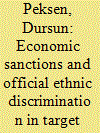

|
|
|
|
|
| Summary/Abstract |
Conventional studies on the consequences of sanctions tend to focus on the target society as a whole without specifying how foreign economic pressures might affect the well-being of vulnerable groups within target countries – the same groups who often disproportionately bear the burden of sanctions. This study explores the extent to which sanctions increase the likelihood of discriminatory government practices against one of the globally most vulnerable groups, ethnic groups. It is argued that sanctions contribute to the rise of official ethnic-based economic and political discrimination through contracting the economy and creating incentives for the target government to employ ethnic-based discriminatory policies. Using data on over 900 ethnic groups from 1950 to 2003, the results lend support for the theoretical claim that sanctions prompt the government to pursue ethnic-based discriminatory economic and political practices in multiethnic countries. The findings also indicate that multilateral sanctions are likely to be more harmful to the well-being of ethnic groups than sanctions levied by individual countries. Further, the negative effect of comprehensive sanctions appears to be greater than that of sanctions with moderate and limited impact on the target economy. The regime type of the target state, on the other hand, appears to have a significant role only in conditioning the hypothesized effect of sanctions on economic discrimination. Overall, this study’s focus on a vulnerable segment of the target society – ethnic groups – offers a greater understanding of the consequences of sanctions. It also provides additional insight as to how, in multiethnic countries, political elites might domestically respond to external pressures to retain power.
|
|
|
|
|
|
|
|
|
|
|
|
|
|
|
|
| 3 |
ID:
129989
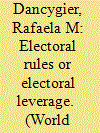

|
|
|
|
|
| Publication |
2014.
|
| Summary/Abstract |
Immigration has fundamentally altered the ethnic and religious makeup of most advanced democracies, but substantial variation is observed in the political representation of immigrant-origin minority groups across countries and cities. Though existing research has highlighted the role of electoral institutions in explaining minority representation, it is often difficult to isolate their effects across contexts. Focusing on Muslims in England and employing a new data set containing over 42,000 candidate-level observations, this article explains Muslim candidate election and selection. To do this, the author makes use of a rule change whereby a subset of localities switched from the use of multimember elections to the use of single-member elections. She finds that these electoral rules have no significant effect on the share of Muslims that gets elected but that they do influence the selection process: in a given election, Muslims are half as likely to be selected when only one seat is up for election as compared with when three seats are in play. Yet parties balance the slate across consecutive single-member elections, leading to similar results across systems. Further, the more undesirable the seat, the more likely it is to have a Muslim on the ticket, but this effect holds only in single-member elections, and it reverses as Muslims gain electoral leverage. Overall electoral leverage proves crucial: the effect of institutions and the potential for institution-based discrimination are conditional on the size and concentration of the local Muslim population and the votes it can deliver at both the election and the selection stages.
|
|
|
|
|
|
|
|
|
|
|
|
|
|
|
|
| 4 |
ID:
185637
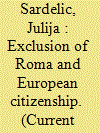

|
|
|
|
|
| Summary/Abstract |
Some 10-15 million members of the Roma minority live in Europe; an estimated 6 million are citizens of the European Union. It was not until the 1990s that European Union institutions began treating Roma as an ethnic minority deserving of human rights protections. Concerns about mass migration of Roma from Eastern European countries where they face severe discrimination was one of the reasons the EU included protections for Roma among the conditions that candidate countries had to meet to qualify for consideration in its most recent rounds of enlargement. Those EU efforts have overlooked similar discrimination and neglect in western member states.
|
|
|
|
|
|
|
|
|
|
|
|
|
|
|
|
| 5 |
ID:
119603
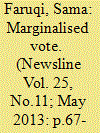

|
|
|
| 6 |
ID:
116308
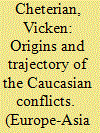

|
|
|
|
|
| Publication |
2012.
|
| Summary/Abstract |
Conflicts in the Caucasus began as a result of the weakening of the institutions of the Soviet Union. Since then there have been some major transformations. Initially, there were 'triangular conflicts' with the centre (Moscow) on the one side and two competing national projects on the other side (a Union Republic and a minority group with an autonomous status within this republic). After the collapse of the Soviet Union, these conflicts evolved into bilateral ones between two popular-nationalist movements with competing territorial claims: newly independent nation states, on the one hand, and minority groups with autonomous status, on the other.
|
|
|
|
|
|
|
|
|
|
|
|
|
|
|
|
| 7 |
ID:
120318
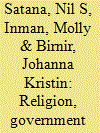

|
|
|
|
|
| Publication |
2013.
|
| Summary/Abstract |
When ethnic minority parties are excluded from government coalitions, are group attributes such as religion related to the groups' use of political violence? We argue that extremist factions within minority groups make use of divergence in religion to mobilize support for violent action when the group is excluded from government. Thus, we posit that while religion per se is not a source of violence, extremist elements of ethnic minorities, whose religion differs from the majority, may use religious divergence to mobilize group members to perpetrate terrorism. Specifically we test the hypotheses that extremist factions of an excluded group will be more likely to carry out terrorist attacks when the group's members belong to a different religion as well as when they belong to a different denomination or sect of a religion than the majority. To test these propositions, we use data on ethnic minority party inclusion in government coalitions, ethnic minority group religion, and the Global Terrorism Database (GTD) by matching perpetrators with ethnic groups for all democracies, 1970-2004.
|
|
|
|
|
|
|
|
|
|
|
|
|
|
|
|
| 8 |
ID:
143598
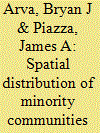

|
|
|
|
|
| Summary/Abstract |
Qualitative studies of terrorist movements frequently highlight the importance of diaspora communities as important factors in producing and sustaining terrorist activity in countries. The underlying theoretical argument is that bifurcation of tight-knit minority communities between countries nurtures separatist or irredentist sentiments among affected community members, thus prompting terrorist activity, while minority community members in other countries might mobilize financial and political resources to support terrorist activity among their compatriots. In this study, we empirically test whether transnational dispersion, versus domestic concentration, of minority communities in countries produces higher incidents of terrorism. Conducting a series of negative binomial estimations on a reshaped database of around 170 countries from 1981 to 2006, derived from the Minorities at Risk database and the Global Terrorism Database, we determine that both transnational dispersion of kin minority communities and domestic concentration of minorities within countries increase terrorism and that transnational dispersion is a particularly robust predictor of terrorist attacks.
|
|
|
|
|
|
|
|
|
|
|
|
|
|
|
|
| 9 |
ID:
118636
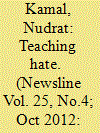

|
|
|
|
|
| Publication |
2012.
|
| Summary/Abstract |
Report by the national commission for justice and peace (NCJP) and the US Commission on international and religious freedom (USCIRF) reveal the extent to which public textbooks foster prejudice and intolerance of religious minorities.
|
|
|
|
|
|
|
|
|
|
|
|
|
|
|
|
|
|
|
|
|